Politics
Trump Blames Zelenskyy For Russia-Ukraine War As Peace Talks Sideline Kyiv. EU $6.2 Billion Military Aid Package For Ukraine—What’s The Real Plan?
Published
1 year agoon

The Russia-Ukraine war is perhaps at its most critical juncture yet. While the world watches anxiously, the first US-Russia talks aimed at ending the war were held in Saudi Arabia. But there was one glaring omission—Ukrainian President Volodymyr Zelenskyy. The exclusion of Ukraine from discussions about its own fate is as symbolic as it is alarming. And to add insult to injury, US President Donald Trump took aim at Ukraine, seemingly blaming Zelenskyy for the war itself.
Trump’s Controversial Take on Ukraine
In his latest remarks, Trump suggested that Ukraine “could have made a deal” before the war escalated, effectively implying that the country was responsible for the ongoing destruction within its borders. His comments echo a similar notion often pushed by Russian President Vladimir Putin—that Ukraine’s resistance, rather than Russia’s invasion, is the cause of the devastation.
Trump also seized on the issue of elections in Ukraine, suggesting that Zelenskyy’s popularity was at an all-time low—citing an approval rating of just 4 percent, a figure that lacks any verifiable basis. While it is true that Zelenskyy’s ratings have declined since the war began, polling in a nation torn by conflict is inherently difficult. At the war’s onset, his approval ratings were near-universal, and even now, they remain far higher than Trump’s claim.
Ukraine was due for an election in April 2024, but Zelenskyy postponed it, citing the challenges of holding a democratic vote in the middle of a full-scale war. The Ukrainian Constitution supports this decision, and the notion of carrying out an election under the circumstances remains logistically and legally complex.
Yet, Trump’s remarks raise an interesting contradiction. He insists on Ukraine holding elections as a measure of democracy, while he himself famously refused to accept the results of the 2020 US presidential election. And if we’re talking about democratic legitimacy, Putin—who has stayed in power for over two decades through questionable elections—somehow remains absent from Trump’s critique.
What’s Really Happening in Riyadh?
The US-Russia talks, led by Secretary of State Marco Rubio and Russian Foreign Minister Sergey Lavrov, have sparked concerns that the new US administration is shifting its stance—from backing Ukraine to negotiating terms that could favor Russia.
Trump’s latest statements mark a significant departure from the earlier US stance, which treated Ukraine as the victim of an unprovoked invasion. Now, by pushing a fresh storyline that undermines Zelenskyy and amplifies Kremlin-backed rhetoric, Trump is signaling a potential new approach—one that could fundamentally alter the course of the war.
The Peace Talks
Tuesday’s talks in Riyadh marked the first significant diplomatic engagement between the United States and Russia in months. US Secretary of State Marco Rubio and Russian Foreign Minister Sergey Lavrov agreed to “appoint respective high-level teams to begin working on a path to ending the conflict in Ukraine as soon as possible,” according to the US State Department.
US National Security Advisor Mike Waltz later reinforced the complexity of the negotiations, stating that discussions would inevitably involve “territory and post-conflict security guarantees.” While this could signal the start of serious deliberations, it also raises questions about Ukraine’s role in shaping its own future.
President Volodymyr Zelenskyy, speaking from Turkiye after a meeting with Turkish President Recep Tayyip Erdogan, made his frustration clear. “No decision can be made without Ukraine on how to end the war in Ukraine,” he asserted in direct response to the US-Russia talks happening without Kyiv’s involvement.
Meanwhile, Lavrov dismissed any possibility of NATO peacekeeping forces in Ukraine under a future deal, reiterating Moscow’s position that any expansion of the alliance would be a “direct threat” to Russia. Despite this, Rubio expressed optimism about Russia’s willingness to engage in peace talks. “There have to be concessions made by all sides. We’re not going to predetermine what those are,” he said, calling the meeting the “first step of a long and difficult journey.”

Trump Tries…The Cause Of The Ukraine War
As peace talks unfold, US President Donald Trump is seizing the moment, his latest remarks not only downplay Russia’s aggression but also subtly shift blame onto Ukraine itself. At Mar-a-Lago, Trump seemed to rewrite history, implying that Ukraine should have avoided the war by making a deal with Russia.
“Today I heard, ‘Oh well, we weren’t invited”‘. Well, you’ve been there for three years. You should’ve ended it after three years. You should’ve never started it. You could’ve made a deal.”
His comments align disturbingly with Kremlin talking points, suggesting that Ukraine’s resistance was optional and that acquiescing to Russian demands would have prevented the war. In reality, any preemptive deal would likely have meant accepting a puppet government in Kyiv or conceding vast territorial losses to Moscow.
Trump also hinted at an upcoming face-to-face meeting with Putin by the end of the month, a move that risks handing the Russian leader an additional strategic advantage. His remarks are likely to deepen skepticism in Europe, where leaders are already wary of his approach to diplomacy.
British Prime Minister Keir Starmer, set to visit Washington next week, has warned that any peace deal requiring European enforcement would need a US “backstop.” Meanwhile, US Defense Secretary Pete Hegseth recently ruled out American troops playing any role in keeping the peace in Ukraine.
Despite his insistence on brokering a deal, Trump remains vague about what a peace agreement should look like. His eagerness to secure a resolution—any resolution—suggests a priority on political optics rather than a meaningful and sustainable end to the conflict. His critics fear that an ill-conceived deal could merely lay the groundwork for future instability, rather than truly bringing peace to Ukraine.
How Are European Leaders Planning To Respond?
Trump’s stance has sparked concern among European leaders and Ukraine’s President Volodymyr Zelenskyy, who has warned that Kyiv would not recognise any deal made without its involvement.
“No decisions about Ukraine without Ukraine … Europe must have a seat at the table when decisions about Europe are being made,” Zelenskyy said at the Munich Security Conference this weekend.
So what’s the Trump administration’s new approach, and how will Europe respond to the new reality?
Zelenskyy, who travelled to the United Arab Emirates on Monday, reiterated that he would not accept any decisions between the US and Russia about Ukraine.
European leaders have also expressed their concerns about the exclusion of Europe and Ukraine from the discussions, and have stated they want to be part of the negotiations.
“A dictated peace will therefore never find our support,” said German Chancellor Olaf Scholz over the weekend after Trump’s unilateral overture to Putin on Wednesday.
Trump later told reporters that Zelenskyy will be involved in the negotiations, without giving further explanation. Keith Kellogg, the US envoy for Ukraine, also tried to reassure that no deal would be imposed on Ukraine.
Kellogg is heading to Kyiv on a three-day visit.
Kyiv, which has lost nearly 20 percent of its territory and thousands of lives, would like to have a deal that addresses its legitimate security concerns.
“We seek a strong and lasting peace in Ukraine. To achieve this, Russia must end its aggression, and this must be accompanied by strong and credible security guarantees for the Ukrainians,” France’s President Emmanuel Macron posted on X a day after he hosted European leaders in Paris.
European leaders are concerned “because neither Ukraine nor Europe is represented. And they think Trump will sell Ukraine down the river,” Timothy Ash, an associate fellow in the Russia and Eurasia programme at Chatham House, commented.

A Europe Left Out of the Conversation
On Sunday, Trump’s envoy for Ukraine, Keith Kellogg, bluntly stated that Europe would not be included in U.S.-Russia peace negotiations regarding Ukraine’s future. The exclusion has only deepened concerns among European leaders, who have been instrumental in providing aid and support to Kyiv since Russia’s invasion in 2022. This announcement followed U.S. Defense Secretary Pete Hegseth’s declaration that Ukraine’s NATO membership is “unrealistic” and that Europe must take on greater military and financial responsibility for Ukraine’s defense.
In an even more pointed remark, U.S. Vice President JD Vance reinforced the message: “Brussels should step up in a big way to provide for its own defense.”
Macron, Scholz, and NATO React
Stung by the abrupt tone of Washington’s new stance, European leaders convened in Paris on Monday. French President Emmanuel Macron hosted key figures from Germany, Denmark, Poland, Italy, Spain, and the Netherlands, as well as officials from NATO and the European Union. The meeting underscored the growing rift between Washington and its traditional allies.
“Ready and willing,” NATO chief Mark Rutte posted on X, signaling Europe’s resolve to bolster Ukraine despite the U.S. shift.
Germany’s Chancellor Olaf Scholz was more direct in his criticism. “A dictated peace will therefore never find our support,” he stated, in response to Trump’s unilateral approach to negotiating with Russia.
Can Europe Step Up?
Despite Trump’s push for Europe to assume a larger burden, European nations have already been ramping up their commitments. Since 2022, European countries have provided approximately $140 billion in aid to Ukraine—surpassing the $120 billion the U.S. has allocated. But Trump wants more.
His administration is pushing NATO members to increase their defense spending beyond the long-standing 2% GDP commitment—one that only 23 of the 32 member states currently meet. Trump is calling for a dramatic hike to 5%, a demand that many European leaders see as both unrealistic and politically fraught.
European Commission President Ursula von der Leyen echoed the sentiment that Europe must take greater responsibility, posting on X: “We need a surge in defense in Europe.”
A Looming Trade War?
The policy shift on Ukraine is just one part of a broader transatlantic strain. Trump has also signaled his intent to impose tariffs on Europe, calling the EU’s economic relationship with the U.S. “an atrocity.” European leaders have vowed to retaliate, raising the specter of a transatlantic trade war at a time when security cooperation is already being tested.

EU Military Aid Package for Ukraine But Fractured Response
Meanwhile, with Washington’s support now uncertain, the European Union is considering a military aid package for Ukraine worth at least €6 billion ($6.2 billion). This package would include artillery shells, air defense systems, and other military supplies. The final amount could rise to €10 billion ($10.8 billion), depending on individual contributions from member states.
However, unanimous approval is unlikely due to opposition from Hungary’s Prime Minister Viktor Orban, who has consistently resisted military aid to Ukraine. As a result, the package may be structured as a coalition of willing nations rather than a full EU-backed initiative.
Even as Europe steps up, a fundamental challenge remains – Can Europe provide the security guarantees that Ukraine seeks? Last week, Washington circulated a questionnaire among European leaders, asking what each country could contribute in terms of security commitments. While details remain unclear, it signals the Trump administration’s intent to shift primary responsibility onto Europe.
However, coming to whether troops should be deployed to Ukraine following a peace deal, at the Paris meeting, European leaders failed to reach a consensus.
The debate has exposed deep divisions. UK Prime Minister Keir Starmer and Sweden have floated the idea of sending troops, but Germany’s Scholz dismissed the notion as “completely premature.” Meanwhile, other European nations, particularly Finland, are wary of any escalation that could endanger their own security.
The Last Bit
Trump’s latest statements mark a significant departure from the earlier US stance, which treated Ukraine as the victim of an unprovoked invasion. As the diplomatic chess game unfolds – is this truly a push for peace, or is Ukraine being forced into an unfavorable settlement? For now, it appears that Washington is playing a different game—one in which Kyiv is increasingly left out of the conversation.
Russia-Ukraine war, as Trump shifts America’s priorities, Europe too faces difficult choices. It must decide how to shoulder more of Ukraine’s defense while also preparing for the possibility of a weakened NATO commitment from Washington.
For now, the continent is scrambling to maintain unity, respond to Trump’s challenges, and prevent further deterioration in transatlantic ties. Can Europe forge a coherent, independent defense strategy, or will divisions and political hesitations leave it vulnerable?

You may like
-
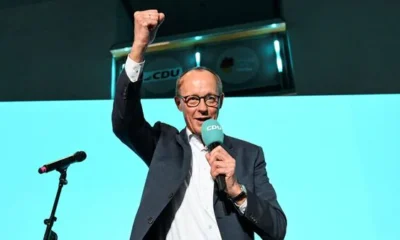

Germany’s Friedrich Merz’s Big Balancing Act—Trump, Borders & Europe’s Future. Can He Deliver?
-
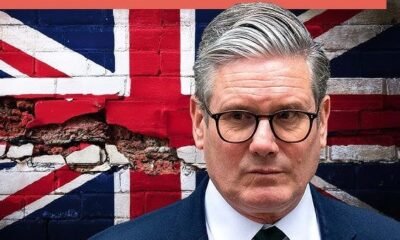

United Kingdom To Unleash Its ‘Harshest’ Sanctions On Russia Yet—But Will They Bite? How Trouble Is Brewing For Keir Starmer At Home. Shamed For Volunteering British Troops In Ukraine
-
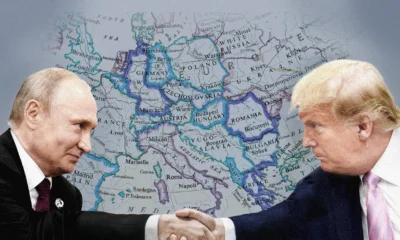

How It’s Not Trump But Vladimir Putin That Europe Is Stinging From: Trump’s U-Turn On Europe, Russia’s Strong Supply Chain—A Formidable Opponent!
-
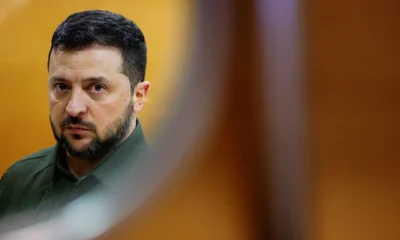

Is Ukraine Now Stuck In The US-Russia Ecosystem? Could Zelensky Have Made A Deal To Stop The War, Is Trump Right?
-
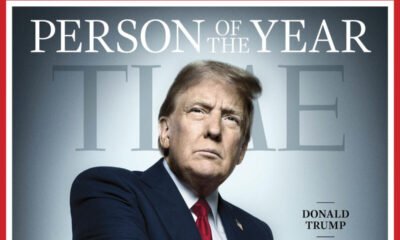

Why Are Japanese Companies Not Happy With Trump? How Trump 2.0 Is Shaking The World Into A ‘Rude’ Awakening?
-
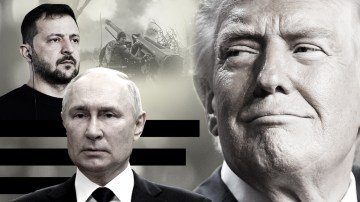

High-Stakes Peace Talks Ahead. Trump Team Leads, Zelenskyy Joins, But Ukraine Faces Tough Concessions—A Betrayal? Even As European Allies Watch In Disbelief